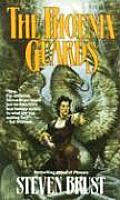
| Series: | Khaavren Romances #1 |
| Publisher: | Tor |
| Copyright: | August 1991 |
| Printing: | June 1992 |
| ISBN: | 0-8125-0689-8 |
| Format: | Mass market |
| Pages: | 491 |
A thousand years before the time of Vlad Taltos, three Dragaerans meet by chance in an inn as participant, second, and judge in a duel. All of them are travelling to Dragaera City to join the Guard, all are young, all are capable with a sword, and all are in search of glory and honor in their own ways. They soon meet up with a fourth and form a close band of companions as they defend their honors, keep their own secrets, and learn more about the intrigues of court. They end up pursuing a noblewoman accused of murder, unsure even as they do whether they plan to aid or capture her, and stumble into and resolve plans and plots that involve the safety of the Empire.
The Phoenix Guards is set in the same universe as the Vlad Taltos series but during the cycle of the Athyra in the previous great cycle, before Adron's Disaster and the Interregnum. It's told entirely from the perspective of the Dragaerans rather than the Easterners (humans) like Vlad, and in a style inspired by the French Romantics such as Dumas, père. The Three Musketeers is an obvious direct model. It's told in a very long-winded and descriptive style, with a distinctive dialogue pattern shared by all of the characters, a sly sense of humor, and a narrative voice so strong that the narrator becomes a character in his own right (a scholar named Paarfi, writing this history in Vlad's time a thousand years later, supposedly based on historical sources but more truly the Dragaeran version of a historical romance).
The style is the most striking part of this book. It apes a writer who was paid by the word, and therefore feels quite padded and circumlocutory. The descriptions of everything are extended just slightly beyond the point of usefulness, Paarfi has a habit of making stuffy interjections or occasional philosophical ramblings in the middle of his writings, and every character in the book is in the habit of talking like this:
"My Captain," she said.
"Yes?"
"It give me great pain, but I must make a complaint."
"What? A complaint?"
"Yes. Against the individual with whom I was partnered."
"The Cavalier Fanuial?"
"Yes, that is his name."
"Well? And your complaint?"
Nearly every exchange manages to take several back-and-forths more than one would expect it to.
This sounds rather off-putting, and at first it is, but it develops a rhythm of its own that becomes quite enjoyable. I can pinpoint the place in the book when Paarfi (and Brust) won me over: it's the eleventh chapter, 100 pages in, which has the delightful subtitle of "In Which the Plot, Behaving in Much the Manner Of a Soup to which Corn Starch Has been Added, Begins, at Last, to Thicken." The digressive tone of the book can be perfectly summed up by that subtitle, as can the wry edge of self-conscious narration that's never far from the story. At multiple places, Brust had me chuckling or laughing out-loud just at the way the story was phrased and the dialogue presented. The preface is wonderful, as are the author bios at the end of the book, in which Brust writes Paarfi's bio and then Paarfi writes Brust's.
Outside of the tone, the plot itself is a swashbuckling adventure, befitting its inspiration, in which the heroes are constantly winning against overwhelming odds, discovering secret identities, foiling plots, and winning over would-be enemies in the nick of time. Their friendship and mutual support is the core of the book, as is the interplay between the quick-witted and outgoing Khaavren, the charming and devious Pal, the straightforward and excitable Tazendra, and the wise and laconic Aerich. Brust, having the benefit of Vlad's universe with its seventeen Houses of Dragaerans, of course picks Houses for the compatriots appropriate to their personalities and lets them play out the dramas of their House personalities, which adds interest for readers of the Vlad series. The story itself is relatively straightforward for a 500-page novel, but there are enough twists and turns to be satisfying and to bear the weight of Paarfi's extended narration.
In terms of world background, despite being set in the past of Vlad's universe, The Phoenix Guards doesn't fill in much. The upcoming books of the series look more likely to do that (Paarfi even hints that they will), but the events of this novel weren't the sort that are memorable a thousand years later. We do meet Adron as a character, though, and a birth of a major character in Vlad's series happens off-stage.
The Phoenix Guards is as sprawling as the Vlad books are tightly packed, which is a godsend to anyone who wished Vlad would explain something for a change, but which makes for a startling difference in first impressions. Under that, however, one sees Brust's gift for narrative style and storytelling, and The Phoenix Guards is recognizable as the same core told in a stuffy voice with elaborate embelishments. Fans of the Vlad Taltos series will definitely want to give it a try, as will any fan of The Three Musketeers. Recommended in general; give the style some time and see if it grows on you as it did on me.
Followed by Five Hundred Years After.
Reviewed: 2008-10-21